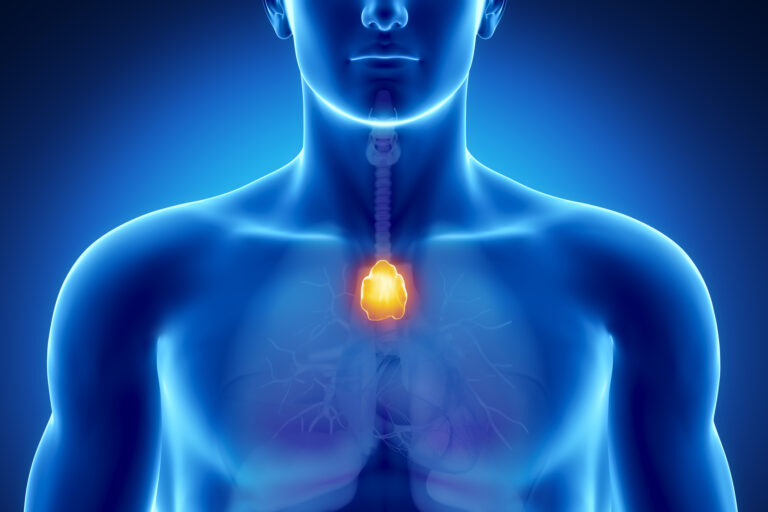
Thymectomy, or removal of the thymus gland, is a procedure recommended in patients with myasthenia gravis who have thymoma (cancers in the thymus). It is also used to improve muscle weakness caused by myasthenia gravis.
전문가와 상담하세요
공제금 지원에 관하여Around 10% of individuals with myasthenia gravis have thymoma, a rare and benign cancer that develops on the thymus, and thymectomy is performed to remove thymic carcinoma or thymoma.
Thymectomy, along with medication treatment, is an effective strategy to improve muscle weakness and remove benign tumors in patients with myasthenia gravis. In this article, we will discuss the indications, contraindications, benefits, side effects, risks, and other topics related to thymectomy for myasthenia gravis.
What Is Thymectomy, and Why Is It Done?
The thymus is a small gland and part of the immune system responsible for the development and maturation of immune cells. It is located in the upper front part of the chest.
The thymus gland develops throughout childhood, and after reaching adulthood, it stops growing and becomes small. However, in patients with myasthenia gravis, the thymus gland is relatively large.
In certain patients with myasthenia gravis, benign cancers develop on the thymus gland, resulting in muscle weakness, and thymectomy is done to remove the thymus gland.
Thymectomy is indicated in patients:
- Below 60 years of age with moderate to severe weakness as a result of myasthenia gravis
- With thymoma or cancers of the thymus gland
- Who have benign thymic cysts, malignant thymic carcinoma, and neuroendocrine tumors (these are some less common indications of thymectomy)
Contraindications of Thymectomy
Thymectomy is not recommended in the following patients:
- Patients who are unable to tolerate complications of surgical procedures, like general anesthesia, or are at risk of impaired clot formation or unstable blood pressure and blood flow
- Patients who have thymoma but are of advanced age
- Patients with ocular myasthenia gravis, a condition in which weakness associated with the disease is limited to the eye muscles
What Is Myasthenia Gravis?
Our nerves are responsible for sending and transmitting signals to the muscles in the form of neurotransmitters (chemicals), which in turn trigger muscle movement.
Myasthenia gravis (MG) is a nerve-muscle autoimmune disease in which antibodies disrupt signals and communication between nerves and muscles, leading to muscle weakness.
In myasthenia gravis, voluntary muscles of the body, like muscles that control the movement of mouth, eyes, throat, and limbs, are commonly affected, resulting in weakness and tiredness of these muscles.
Thymectomy for Myasthenia Gravis
The thymus gland plays an important role in developing the immune system throughout childhood as it produces T cells, a type of white blood cell that helps fight and prevent infections.
As stated earlier, the thymus gland stops growing and gradually becomes smaller at puberty until it is replaced by fat. However, in patients with myasthenia gravis, the thymus gland remains relatively large even in adulthood.
Moreover, clusters of immune cells may accumulate in the thymus and progress to tumors known as thymomas, which are harmless but may become cancerous. Removing the thymus gland helps improve muscle weakness.
The exact relationship between thymoma and myasthenia gravis is not fully understood, but it is believed that they share an autoimmune link, as myasthenia gravis is also an autoimmune disease. Abnormalities in the thymus may have a role in developing autoimmune conditions, including myasthenia gravis.
Get Financial Assistance for
중증 근무력증Benefits of Thymectomy in Myasthenia Gravis
There are multiple benefits of thymectomy in myasthenia gravis, including:
- A significant improvement in muscle weakness and fatigue
- Reduction in medications used for myasthenia gravis
- Ideally, a permanent remission from the disease
- Removal of tumors
- A reduction in symptoms and improved muscle strength that helps enhance the overall quality of life in patients with myasthenia gravis
However, the effectiveness and outcomes of thymectomy in patients with myasthenia gravis depend on individual health needs. Hence, the decision to undergo thymectomy should be made after consultation with healthcare professionals.
Thymectomy Side Effects
Thymectomy is considered a safe and effective procedure if performed on the right candidates by an experienced surgeon. However, the procedure still has some potential for risks and complications.
Some common side effects or complications of thymectomy may include:
- Injury near the heart, nerve, or blood vessels
- Bleeding
- Nausea or vomiting
- Pneumonia
- Accumulation of lymphatic fluid between the lungs and heart
- Atrial fibrillation or irregular heart rhythm













